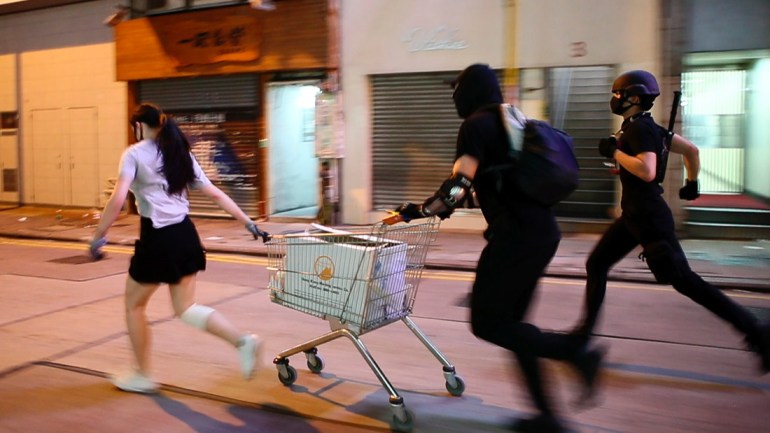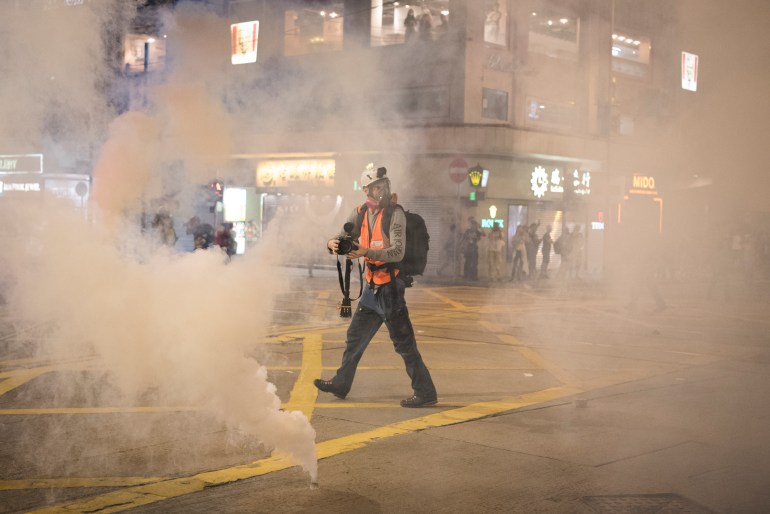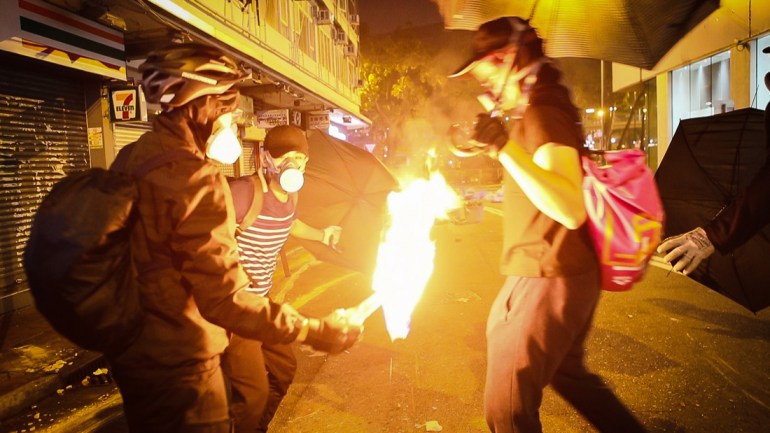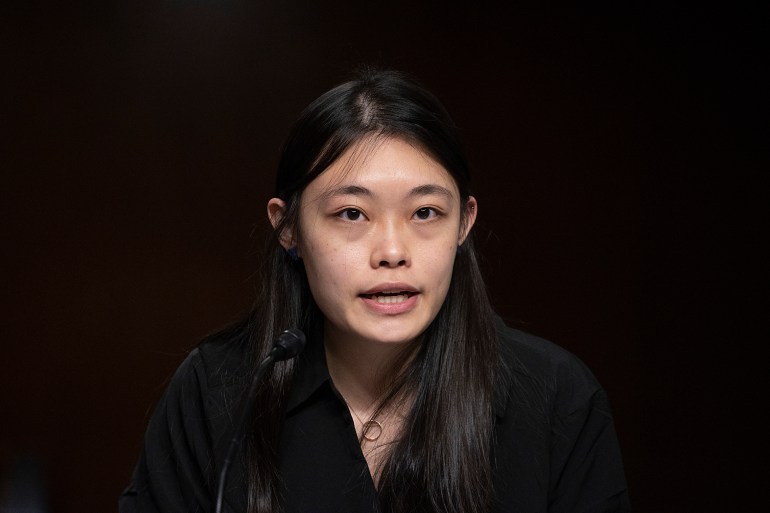Film on 2019 Hong Kong protests vies for Oscars, riles China
Do Not Split does not shy away from the violence of the protests, but at its heart is the emotional toll on the young people struggling to protect the city they love.

Do Not Split's Oscar nomination has riled China [Anders Hammer/Courtesy of Sundance Institute]
By
Kate Mayberry
25 Apr 2021
Growing up in Hong Kong, Joey Siu imagined she might become a secondary school teacher, but two years ago, as pro-democracy protesters filled the streets of the Chinese-ruled city, she found herself taking a different path.
Siu joined the rallies as a student activist, but quickly took on a more prominent role in the movement, advocating for international help and speaking regularly to the media.
Then, in June last year, China imposed the National Security Law – broadly worded legislation it said was necessary to deal with secession, terrorism, subversion and “collusion with foreign powers”.
Overnight, social media accounts were closed, pro-democracy groups shut down. The protests, already quietened by the coronavirus pandemic, evaporated.
Some chose exile. Siu agonised for weeks about what to do.
“I never really thought about leaving Hong Kong this soon,” the now-21-year-old told Al Jazeera from Washington, DC, where she eventually settled in October last year. “I always thought I would have a career in Hong Kong, and a future and that it would be the city I would live in permanently.
“[But] I realised if I chose to leave Hong Kong, I could do more for Hong Kong.”
The tumultuous political developments in the Chinese territory, Siu’s own growth as an activist and the emotional toll on the protesters as they struggle for the city they love are at the heart of Do Not Split, the 35-minute film by Norwegian director Anders Hammer that is in contention for best short documentary at the Oscars on Sunday.
‘No way to defend ourselves’
Described by Variety as “visceral, up close and personal”, Hammer went down to the streets to film alongside the protesters and capture not only the unpredictability of the protests, but their raw emotion.

A still from Do Not Split by Anders Hammer, which has been nominated for an Academy Award [Anders Hammer/Courtesy of Sundance Institute]
From its opening with a group of black-clad protesters breaking into a Chinese-owned bank, to a group of police officers pushing a protester to the ground, flattening his cheek to the tarmac, his shirt ripped off, and his belly exposed, the film does not flinch from the increasing violence of the confrontations between police and protesters.
Throughout there are clouds of tear gas, sprays of water cannon and the putt-putt of rubber bullets.
Siu remembers how the protesters struggled with how to deal with the police’s escalating response.
“When the movement first broke out most of the protesters, including myself, were new,” she said. “We did not know how to deal with tear gas, rubber bullets and everything.”
At first, the police gave the crowds the space to disperse and return home, but then their tactics changed, she remembers.
Protesters often found themselves boxed in under volleys of tear gas, water cannon and rubber bullets. Some protesters were shot with live ammunition.
The government had also made clear those arrested could be charged with rioting, an offence punishable with a jail term of as many as 10 years.
“There was really no way to defend ourselves, other than by also deploying a certain level of force,” Siu said.
Emotional toll
Hammer arrived in Hong Kong in June 2019, and – apart from a quick trip back to Norway to collect more gear – spent weeks on the ground.
While some of the violence was disturbing – Hammer points to the standoff with police at the Chinese University of Hong Kong, which was besieged in November – it was the spirit and determination of the protesters that most affected him.
“Seeing the stress, the desperation and how protesters were trying to still keep hope even though it was becoming more and more difficult for them to protest and they could see very clear signs that Hong Kong was developing in the opposite way than they were fighting for,” he told Al Jazeera.

Anders Hammer on location in Hong Kong filming, Do Not Split. He decided to go onto the streets, build trust with the protesters and film alongside them [Courtesy of Oliver Haynes]
“They wanted to protect and keep the city as they knew it and they were fighting against this closer relationship with Beijing. And they were protesting because they felt their basic democratic rights were disappearing.”
Hammer gives space for the protesters to talk about their motivations and their sense of betrayal.
“The British handed us over to China like a bag of potatoes,” one says of the United Kingdom, which ruled Hong Kong as a colony until 1997.
Siu is shown wrestling with the psychological impact of the unfolding events.
“When our own city is decayed, [and] falling apart,” she tells Hammer. “What is the point of us thinking about our future.”
The 2019 protests began against a Hong Kong government plan to allow suspects to be sent for trial in mainland China, where the courts are controlled by the Chinese Communist Party.
A million people marched through the streets of the city on June 9, and nearly double that the following week – the biggest protest in the territory’s history – but it was not until September that chief executive Carrie Lam finally withdrew the bill.
‘Dark times’
The rallies did not emerge out of nowhere, however. Hong Kong people had long been chafing at Beijing’s tightening grip.
At the handover, the country’s Communist Party leaders had promised to respect the territory’s rights and freedoms – unknown in the mainland – for at least 50 years.
Before the 2019 protests, the biggest demonstration in the territory had been 16 years earlier against plans to introduce a national security law, which were then dropped by the government.
Demands for universal suffrage – a key demand of the 2019 protests – and the right to choose the city’s leader have periodically erupted into mass demonstrations, notably in 2014 when tens of thousands joined a peaceful 79-day sit-in in the heart of the city, after Beijing declared the territory did not have autonomy.
“I felt this was one of the most important events in international politics at the time,” Hammer said of why he decided to go to Hong Kong in 2019. “I still think it is.”
The protests had already cooled even before the National Security Law was imposed, but critics have said the legislation has effectively criminalised even legitimate forms of political dissent.







 Reply With Quote
Reply With Quote








